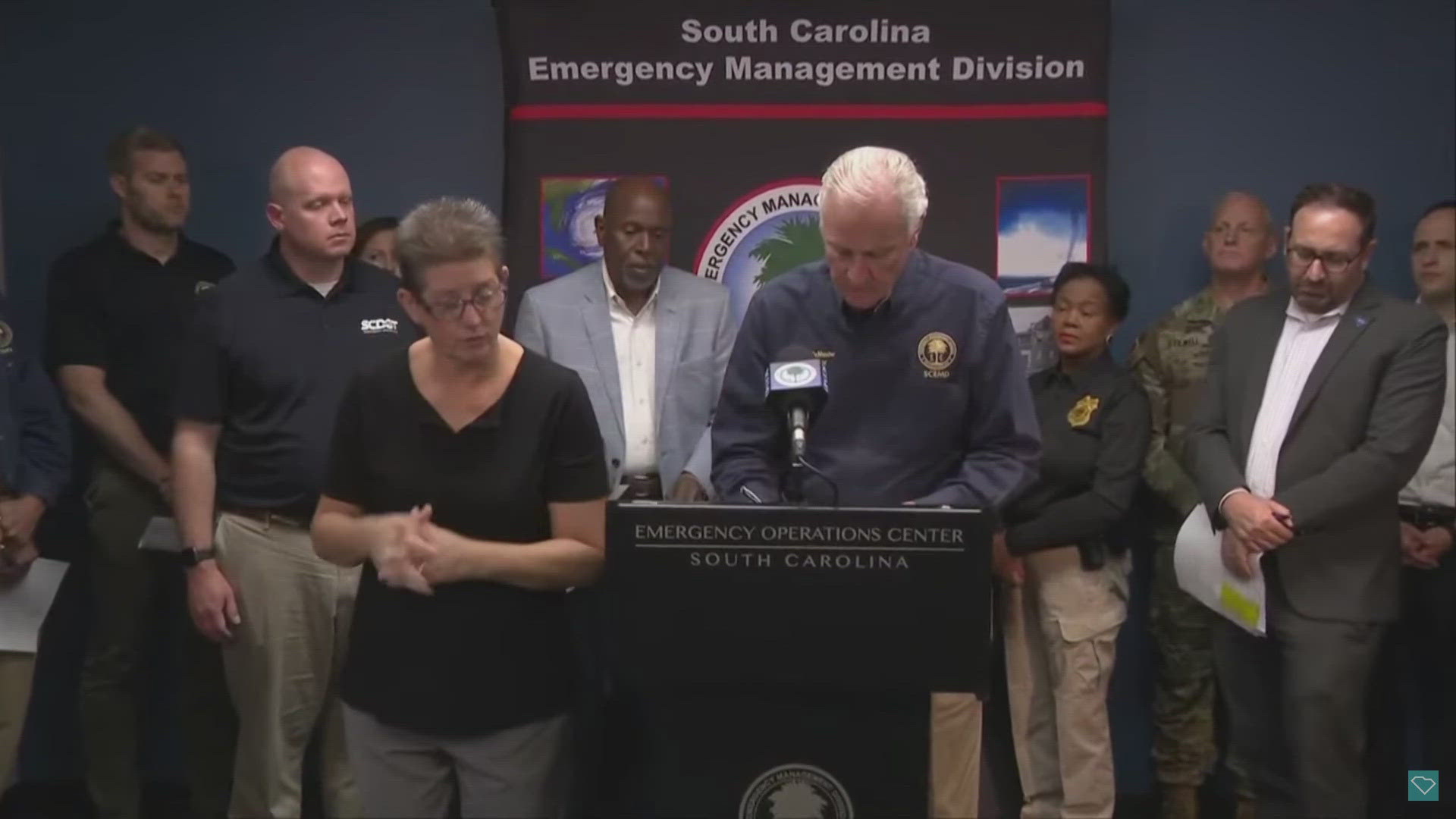COLUMBIA, S.C. — South Carolina Gov. Henry McMaster and other state officials held a news conference in Columbia to discuss Helene relief efforts.
Officials gathered at the emergency management headquarters in Columbia.
State officials now confirm 36 storm-related deaths from Helene in South Carolina, including the first reported in Richland County.
The South Carolina Department of Public Safety posted the latest information on fatalities Tuesday afternoon. Earlier in the day, they'd posted that there were 33 deaths.
The Richland County death was a woman who was killed when a tree fell on her camper last Friday., according to the coroner's office. Officials identified her as 77-year-old Neva Rouse. Further details about where the death took place where not immediately available.
In updated numbers released Tuesday, state officials said 18 counties are reporting over 1,500 damaged homes, 66 of which are destroyed and 517 that have significant damage.
Meanwhile power outages continue to go down but there are still areas with significant numbers of customers without electricity. As of 11:30 a.m. Tuesday, there 609,000 outages statewide, according to PowerOutage.us, a website that collects data from all utility providers in the country. That number is down from a peak of nearly 1.4 million at the height of the storm last Friday morning.
With Helene's death toll nearing 150, searchers fanned out across the region, using helicopters to get past washed-out bridges and hiking through wilderness to reach isolated homes. Nearly half of the deaths were in North Carolina, while dozens of others were in South Carolina and Georgia.
Many who lived through what was one of the deadliest storms in U.S. history were left without electricity or any way to reach out for help. Some cooked food on charcoal grills or hiked to high ground in the hopes of finding a signal to call loved ones.
President Joe Biden was set to survey the devastation in the region Wednesday.
More than 150,000 households have already registered for assistance with the Federal Emergency Management Agency — a number that is expected to rapidly rise in the coming days, said Frank Matranga, an agency representative.
Nearly 2 million ready-to-eat meals and more than a million liters of water have been sent to the hardest-hit areas, he said.
With at least 31 killed in South Carolina, Helene was the deadliest tropical cyclone to hit the state since Hurricane Hugo made landfall north of Charleston in 1989, killing 35 people.
Storm Information Hotline:
The South Carolina Emergency Management Division said they've created the Helene information line at the following number: 1-866-246-0133. People who have questions about the storm can call operators with the State's Public Information Phone System 24 hours a day. The number will be available for as long as needed.
SNAP Benefits Update:
The South Carolina Department of Social Service said it is requesting a waiver from the federal government to allow DSS to automatically issued food replacement benefits to SNAP recipients who lost food during the storm. The benefits would only be available in counties where 50 percent of the total population of the county experienced a power outage lasting more than four hours. The agency said the amount of replacement benefits a family could expect are based on their monthly issuance date.
One SC Fund set up for victims of Helene
We know many have been asking how they can help the storm victims. The Central Carolina Community Foundation has now set up a place where people can donate to the One SC Fund to support non-profits who are responding to individuals who are suffering from the storm.
Charitable contributions can be made to the One SC Fund:
- Online at www.OneSCFund.org
- By mailing a check payable to Central Carolina Community Foundation – One SC to: Central Carolina Community Foundation, 2142 Boyce Street, Suite 402, Columbia, SC 29201.
The One SC Fund is a statewide disaster response initiative supported by philanthropic donors, corporate partners, and funders from across the state and country. In coordination with the South Carolina Office of Resilience, an agency of Governor Henry McMaster’s Cabinet, resources received by the fund are directed to South Carolina communities most in need.

